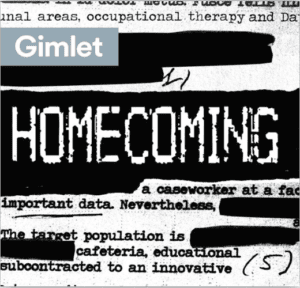
Shelf Unbound/Podster: What led to your writing career?
Micah Bloomberg: I went to NYU undergrad for film production. You just get thrown into the mix—you’re 17 or 18 and think you’re going to be the next Orson Wells or Wes Anderson. I wanted to write and direct, but I discovered I could do neither, which was a bitter pill to swallow. But in taking all kinds of classes—writing, film theory, acting—I found that I had a knack for production sound. When you shoot something you need a camera, actors, a director, costumes, and makeup, and you also need a production sound mixer. That person’s job is to record the sound of the dialogue on set. I found that I had a knack for that one position, so I ended up pursuing that and doing that for years. I was secretly writing the whole time, but in the meantime I did 35 feature films as a sound mixer and was nominated for an Oscar and a BAFTA.
It came to a point with my writing where I was increasingly able to show it to other people and take feedback and make adjustments. I also started writing shorter, more manageable things. Those allowed me to transition from sound to full-time writing.
I’ve done two movies: Stand Clear of the Closing Doors, taken from a true life story about a young autistic boy who runs away and travels the subway for 11 days. That script existed and I was brought on to re-write it with Sam Fleischner. It went on to Tribeca and won jury. Another director, Ben Dickinson, read some short films I had written that were focused on attacking the ad industry. He was writing a satire about that and thought it would be a great fit if we wrote it together. The result, Creative Control, went to SXSW and won a jury prize, and was picked up by Amazon.
Shelf Unbound/Podster: Tell us about working on Homecoming.
Micah:Eli was working with Gimlet to develop a narrative podcast and was looking for someone who had written scripts before because it was going to be driven by dialogue. He called me up and we talked about a couple of prompts that he had worked up. One was about people in a bunker, which through a convoluted multifaceted process led to Homecoming.
When you have to tell a story through what people are saying, it can be difficult to get the characters to do the beats on an outline. You put the characters in the room and they need to move the story forward. What people find challenging when they go to write a movie or play is that they know what they want to happen, but the tricky part is getting the characters to do it and to tell the story without seeming like robots. Eli had some concepts and things he wanted to explore, but his experience was prose and novel writing, which follow different rules to move the story forward. He needed a more specific set of skills to move the story where you could only hear people talking.
Giving character through voice and through speech is what I brought to the table. What I discovered is that we were dealing with a different format than film, which should have been apparent to me up front. We had an early pilot that made it clear we needed to think hard about the format and listen to some other podcasts and radio plays. We realized there are fundamental things that need to be addressed. You can’t see faces or props, so who is speaking, where are they, and what are they holding in their hands—all of those need to make a distinct sound. It could be a voice or the way that they speak; there’s a harmonica, there’s the aquarium in the office—they are selected for story purposes but they also need to make a sound so they can be registered in a scene. When denied the physical storytelling of making a movie, I had to go back to the drawing board and think about how information was being delivered aside from the actual dialogue.
Shelf Unbound/Podster: What have you enjoyed about working in this format?
Micah: To me the best part is that there is no production limit—it’s basically your imagination. When you are writing for film you need to be conscious of what you are asking them to create when you write it. If you write an airplane, someone is going to need to make that. There are limitations in how many parts you write for a podcast but the rest is just up to you and what you want to have happening. In that way it’s been really liberating and fun. And then the theatrical focus on telling the story through words doesn’t happen as much in movies. It’s been a refreshing focus on what is expressed through what people are saying. Dialogue is the start of the show.
